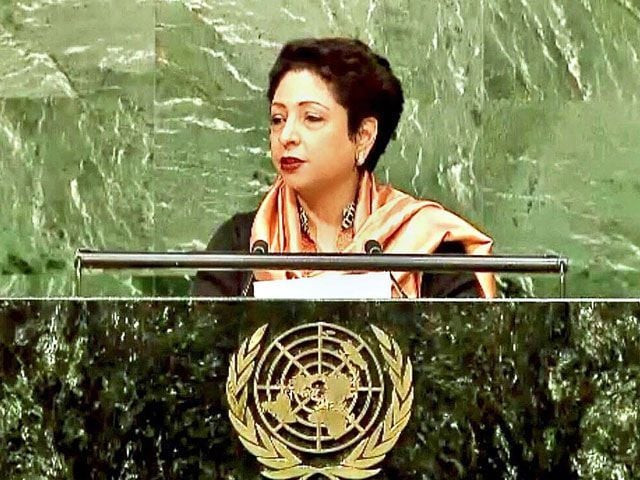Pakistan says UN should 'do more' to ensure safety of peacekeepers
If the UN cannot protect itself, how will it be able to protect others, Ambassador Lodhi asks UN officials

Pakistan's Permanent Representative to the United Nations Maleeha Lodhi. PHOTO: APP
Ambassador Lodhi made these remarks at the UN Headquarters in New York while opening a meeting as the co-chairperson of the Group of Troop and Police Contributing Countries to the UN peacekeeping operations.
Pakistan and Morocco set up the Group of Troop and Police Contributing Countries last year to facilitate an open and frank exchange of views on issues of concern to the countries contributing troops to UN peacekeeping and to brainstorm responses to the new challenges facing world peace and security.
Pakistan vows to resist UN reforms serving interest of 'a few countries'
The Pakistani envoy appreciated a report titled 'Improving Security of UN Peacekeepers' released by the UN last month, reviewing the safety and security of peacekeeping missions, especially in the wake of the unprecedented number of casualties last year.
The report was prepared for UN Secretary General Antonio Guterres by Lt Gen Carlos Alberto dos Santos Cruz, a retired Brazilian military officer.
She welcomed and thanked the Under-Secretary-General for Peacekeeping Operations, Jean Pierre La Croix, for agreeing to brief the meeting on the critical issue of safety and security of UN peacekeepers and give an overview of the ongoing strategic reviews of peacekeeping missions.
Under-Secretary-General La Croix, briefing the meeting on the Cruz Report, said this was not only about reducing fatalities, but also about the performance of peacekeepers.
US threatens to unveil anti-Pakistan actions
He said the report was initiated after the surge of attacks last year, when fatalities doubled. He paid tribute to the sacrifices of soldiers from TCCs (troop-contributing countries) and appreciated their services to international peace and security.
Omar Hilale, the Moroccan Ambassador to UN and the other co-chair of the meeting, said that peacekeeping needs a broader and more comprehensive approach and a long-term plan of action.
"We are confident that close cooperation and coordination with TCCs can bring considerable added value to this long-term plan, and strengthen the confidence and understanding between the TCCs and the UN Secretariat," he added.
Recalling the first casualty of 2018 of a Pakistani peacekeeper in the UN Mission in the Democratic Republic of Congo, Ambassador Lodhi said that all troop-contributing countries fully understand the enormity and gravity of the challenge at hand.
"We also know that these threats neither weaken the resolve of TCCs to serve the cause of international peace and security nor do they diminish the efficacy of peacekeeping itself," she stressed.
The Pakistani envoy noted that over the years, peacekeeping has evolved into a much more complex enterprise than initially envisaged.
Peacekeepers, she said, were increasingly deployed in perilous operating environments, in uncharted territory, and even in situations where there is no peace to keep.
Pakistan, US resetting ties amid changing geopolitical situation: Maleeha Lodhi
Raising alarm at the increase in the frequency of attacks and deliberate targeting of UN Peacekeepers, Ambassador Lodhi said that blue berets are frequently attacked and deliberately targeted, a phenomenon that was unheard of just a few years ago.
"If the UN cannot protect itself, how will it be able to protect others" Ambassador Lodhi asked, and emphasized the need for consultations to bring together planners and implementers of mandates for a better understanding of the risks on the ground.
Involving TCCs at an early stage will not only clarify things but also create better situational awareness for our troops when they are actually deployed, she added.
Calling for adequate allocation of resources, she said that at the time of deployment, resources must be allocated on the basis of a realistic assessment of gaps to effectively implement mandates.
"The mantra of doing more for less should not be at the cost of safety and security," she stated.



1725254039-0/Untitled-design-(24)1725254039-0-208x130.webp)















COMMENTS
Comments are moderated and generally will be posted if they are on-topic and not abusive.
For more information, please see our Comments FAQ